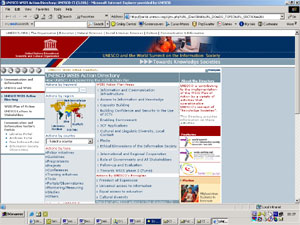UNESCO’s WSIS Action Directory Launched
10-06-2004 (Paris)

www.unesco.org/wsisdirectory
UNESCO’s WSIS Action Directory, an online platform providing access to information on UNESCO’s contribution to the implementation of the Plan of Action adopted by the World Summit on the Information Society in December 2003 has now been launched at http://www.unesco.org/wsisdirectory.
UNESCO’s activities that operationalize the Organization’s concept of “Knowledge Societies”. can be accessed by the categories of the WSIS Action Plan, UNESCO four principles for Knowledge Societies, regions and countries, types of actions, and by UNESCO’s main fields of competence.
UNESCO’s key activities and recently added entries are regularly highlighted on the homepage of the Directory. For each activity, detailed information on its links to the WSIS Action Plan, its type, geographical location as well as a contact information and a URL for further reading are available. Rate and review functions are available for the community to rank and comment on each of UNESCO’s activities.
The Declaration of Principles and Plan of Action adopted at the closing of the Summit expresses an international consensus on the values which should underpin the building of inclusive and pluralist societies in which all can benefit from the potential of ICTs.
For UNESCO, these texts constitute a recognition by the international community of the principles that UNESCO has been promoting consistently as being essential for the development of equitable knowledge societies, namely: freedom of expression; universal access to information and knowledge, especially information in the public domain; the preservation and promotion of cultural diversity, multilingualism and local content; and equal access to quality education.
The recognition of these UNESCO values and principles in the political declaration of the Summit is thus not only of satisfaction to UNESCO, but even more relevant given the increasing potential of knowledge for attaining the Millennium Development Goals as well as a means of social transformation and economic development.
UNESCO’s key activities and recently added entries are regularly highlighted on the homepage of the Directory. For each activity, detailed information on its links to the WSIS Action Plan, its type, geographical location as well as a contact information and a URL for further reading are available. Rate and review functions are available for the community to rank and comment on each of UNESCO’s activities.
The Declaration of Principles and Plan of Action adopted at the closing of the Summit expresses an international consensus on the values which should underpin the building of inclusive and pluralist societies in which all can benefit from the potential of ICTs.
For UNESCO, these texts constitute a recognition by the international community of the principles that UNESCO has been promoting consistently as being essential for the development of equitable knowledge societies, namely: freedom of expression; universal access to information and knowledge, especially information in the public domain; the preservation and promotion of cultural diversity, multilingualism and local content; and equal access to quality education.
The recognition of these UNESCO values and principles in the political declaration of the Summit is thus not only of satisfaction to UNESCO, but even more relevant given the increasing potential of knowledge for attaining the Millennium Development Goals as well as a means of social transformation and economic development.
Related themes/countries
· Portals/Directories
· 2004
· News Archives 2004
Share this story:
Contact information
- UNESCO
Source














